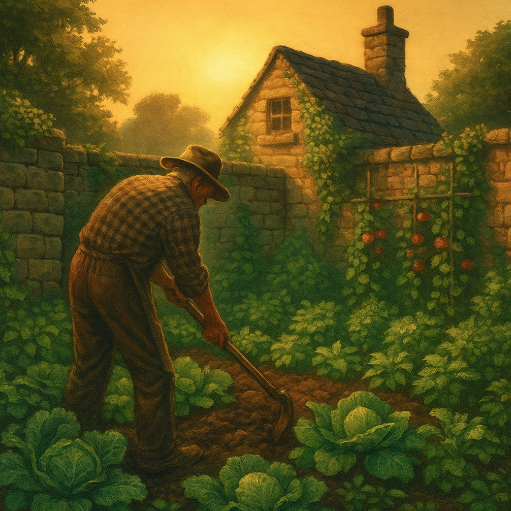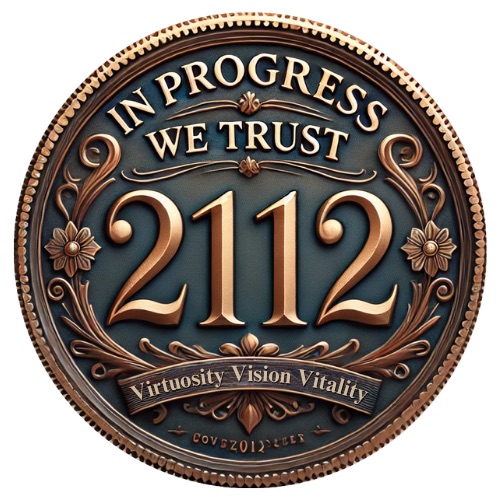Adopting the Farmer's Mentality
I woke up early this morning and noticed the dappled light on our lawn. All was quiet, and I felt an extra motivation to get on with the day. For some reason, I began to contemplate how farmers rise early, work hard, eat heartily at the end of the day, and follow a routine that only shifts with the seasons. I realized I've been leaning in that direction with my own life, and it felt good.
I come by this honestly. Each summer when I was a kid, my mom would take us back to her homeland of Scotland to stay at the family farm. My grandad and granny welcomed us warmly, and we enjoyed adventure and play that were wholesome, invigorating, and exhausting - a perfect recipe for kids who fell asleep the moment their heads hit the pillows. That left the adults free to sip their whiskey and talk of days (and people) gone by.
I decided I would write a blog post on this before 7 a.m. - the modern man's routine, perhaps? And when I checked through some family archives, I stumbled on a photo of my grandfather's gravestone: Died Aug 26, 1984. I was astonished. Today is Aug 26, 2025. Does the brain really keep track of such things in the background? Is that "background memory" what triggered me to think of the farmer's life today? Strange things.
My grandfather - "Grandad," as we called him - was Alexander Marshall Wright of Cousland (near Dalkeith), Scotland. He was a successful businessman and farmer. By the time I knew him, he still lived in a farmhouse on active farmland but spent his days mostly as a gardener. As a young man, he had gone to British Guiana to work as a farm manager under colonial schemes. He saved his wages - five thousand pounds - and returned to the UK just as farms were transforming with mechanization. He invested in a gas station, trucks, and land, and built thriving enterprises: dozens of transport trucks, a café, a trailer park, a petrol station, and farmlands. He grew barley, raised pigs, and eventually retired to an old stone farmhouse at Northfield Farm, overlooking a wide expanse of greenery fenced by distant hills. To the west, Arthur's Seat in Edinburgh stood in clear view.
By then, his businesses mostly ran under others' care, though he watched as poor management slowly unraveled much of what he had built. Still, he had his farm, his garden, his routine, and his whiskey.
The most important trait I remember about Grandad was his steadfast routine. I recall it vividly because I was often his "farmhand." His mornings looked like this:
- Early Rising Wake at 5 a.m. and prepare a mash for the hens: wheat bran, oats or barley, cornmeal, vegetable peelings, boiled potatoes, some milk, and likely minerals (grit or oyster shell was offered separately for calcium).
- Useful Activity Carry the mixture to the henhouse, fill the feed troughs (while carefully avoiding the stinging nettles!), and stir the hens into movement.
- Slide open the little door so the birds could march out for breakfast.
- Productivity While they ate, open the man-door, basket in hand, and collect the eggs. Often, my siblings would join the fun.
- Return to the house and immediately boil a couple of eggs to enjoy with buttered toast. He always prepared the same for me, calling me "bud." I see now the double-meaning - that I was both his buddy and a "bud" on the family tree.
- With breakfast, we had fresh milk that appeared magically in foil-topped glass bottles on the sidewalk. The cream at the top was thick and delicious - I always got first dibs.
- Setup The Near-Term After breakfast, and after a brief word with the "real" farmhands, we'd head to the garden to harvest vegetables for lunchtime soup: potatoes, carrots, leeks.
- Back in the kitchen, a pot of leek and potato soup would soon be simmering on the stove. "It's amazing what one can accomplish before others have even had their breakfast."
- By the time the household stirred, we were in the parlour: a big-windowed room with a fireplace, warm with coal lit by Granny. On the back wall was a birdcage covered with a small blanket. When uncovered, a black myna bird would greet us with oft-out-of-place vocalizations: "Would you like a drink?". If we were lucky, it would say "Good morning."
- Education Grandad would settle into his chair, BBC news on, The Scotsman (newspaper) in hand, puzzles and chatter shared between us. He'd light a cigarette, though often it smoldered untouched, more of a smoky incense than a personal indulgence to him I think.
- Big Picture Stuff The morning passed with calls from farmhands about pigs or from business people seeking advice or money - he was a small-time financier and a full-time advisor it seemed.
- Purposeful Recreation After lunch, he retreated to his little workshop, building potato crates for local farmers - not for money, but for the satisfaction of work and usefulness.
- Rewards and Socializing Supper was always a feast prepared by Granny, with family and friends in attendance all gathered at the long dining room table. Naturally, Grandad at the head. Whiskey flowed afterward to cap the day.
- Early To Bed By 8 or 9 p.m. he retired for the night. I followed shortly thereafter
I watched that routine play out for multiple consecutive summers, four to six weeks at a time. I'm sure he carried it on daily, monthly, season by season, to the end of his days. He had found his groove, his happy place. He was a contented man. I miss him.
In the chaotic world we live in, it's tempting to be pulled in every direction. World events demand attention, self-possessed fools crave an audience, and it's hard to ignore the noise. But left unchecked, they poison the well of the good life.
My renewed sense of setting a personal agenda - finding a groove and sticking with it - that is my way forward. It doesn't mean becoming oblivious. In fact, by detaching from chaos, I believe I can see with more clarity, separating wheat from chaff, and focusing on what really matters.
Mom used to say: "As the twig is bent, so grows the tree." I hope she's right. The influence of my Grandad and so many others in my early life shaped me in good ways.
A farmer's approach to life...
as a playbook for today's businesses
Farming is strategy, patience, and gritty execution. Here's how the field maps to the boardroom.
-
Seasons → Business cycles
Plan distinct phases—discover, build, launch, optimize. Don't try to "harvest" (sales) during your planting (R&D) season.
-
Soil health → Culture & infrastructure
Strong foundations (culture, data, tooling, processes) compound yields for years.
-
Crop rotation → Portfolio diversification
Balance cash crops (core revenue) with soil-builders (long-term bets) to avoid depletion and risk concentration.
-
Weather uncertainty → Market volatility
Build resilience: scenario plans, buffers, diversified suppliers, insurance, and SLAs.
-
Field trials → A/B testing
Pilot varieties (features/pricing/channels) on small plots; scale only what proves out.
-
Weeds & pests → Technical debt & competitors
Schedule "weeding" sprints for bug bashes, refactors, and security patches.
-
Equipment maintenance → Platform reliability
Preventive maintenance and observability beat outages on launch day.
-
Water & nutrients → Cash flow & talent
Keep the lifeblood flowing: monitor cash weekly and invest in capable people.
-
Fences & gates → Security & access control
Clear, simple boundaries (MFA, least privilege, audits) protect without blocking work.
-
Barn raising → Cross-functional collaboration
Unite product, engineering, sales, and ops for focused "raising days" on big launches.
-
Patience & timing → Go-to-market discipline
Right timing matters as much as quality; align launches with buying cycles.
-
Harvest logistics → Working capital & ops
Plan storage, transport, fulfillment, credit terms, and collections—harvest isn't just the field.
-
Stewardship → Sustainable advantage
Ethical AI, privacy, durable code, and customer trust create long-term fertility.
-
Succession & seasonality → Org design
Document, train, and design roles so teams can rotate, rest, and hand off without losing yields.
Quick ways to apply this week
- Create a 13 Week Quarterly "season map": Plant (research), Grow (build), Harvest (sell), Restore (refactor/retros).
- Schedule a monthly "Weed Day" to kill bugs, pay debt, and patch security.
- Run one small "field trial" per quarter with explicit success metrics.
- Draft a resilience checklist: cash buffer, supplier alternatives, incident drills, backup tests.
- Invest in "soil first": improve one foundation (analytics, CI/CD, CRM hygiene) before new features.
Notes to Self:
- Put aside meandering paths and embrace routine and orderliness on a course of my choosing.
- Put aside the pings and dings of modern culture and embrace wholesome industriousness.
- Put aside the noise of world leaders who thrive on attention and instead focus on a purposeful agenda.
- Put aside the rollercoaster of constant distraction and embrace the steady flow of a day, and the rhythm of the seasons.



